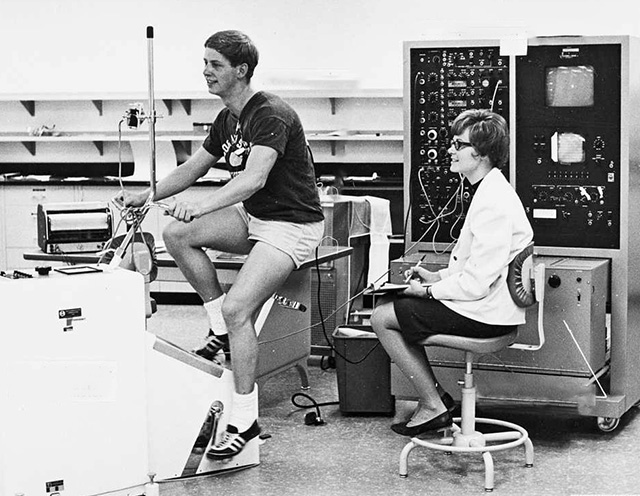In scientific research, a control group serves as the baseline against which the effects of a particular intervention or experimental condition are measured. It's a group in an experiment that remains unchanged or unexposed to the treatment being tested, allowing researchers to compare and evaluate the impact of the treatment or experimental manipulation.
 sport science laboratory
sport science laboratoryThe purpose of a control group is to ensure that observed changes or outcomes can be attributed to the specific intervention being studied rather than any external factors. Researchers use control groups to enhance the validity and reliability of their findings by minimizing bias and isolating the effects of the variables they're investigating.
Here are a couple of examples of how control groups can be used in sport science research.
Exercise Science Example
In a physical exercise research study investigating the effectiveness of a new workout routine on muscle strength, a control group could be incorporated by having participants in the experimental group follow the new routine, while participants in the control group maintain their regular exercise regimen, which could be no exercise or a standard workout routine. Both groups would be assessed for muscle strength at the beginning and end of the study. By comparing the changes in muscle strength between the experimental group and the control group, researchers can determine whether any improvements observed in muscle strength were due to the new workout routine or simply a result of regular physical activity or other external factors. The control group allows researchers to isolate the specific effects of the new exercise routine and ascertain its impact compared to the absence of change or the effects of a standard routine.
Sports Nutrition Example
In a sports nutrition research study a control group would likely consist of athletes who receive a placebo or a standard diet product. For example, if you were examining the effects of a new energy drink on athletic performance, the control group may drink water instead of the energy drink. Both groups—those drinking the energy drink and those drinking water—would follow the same training regimen and diet. By comparing the performance outcomes between the group consuming the energy drink and the control group consuming water, researchers can evaluate whether any observed improvements in athletic performance are due to the specific effects of the energy drink. The control group ensures that any changes in performance can be attributed to the energy drink rather than external factors or the passage of time. Alternatively, you may wish to set up the study so the control group consumes a placebo. If the control group ingested a similar energy drink, but without the active ingredient, it controls for any observed changes that may be a result of psychological factors like expectation.
Related Pages
- Example Informed Consent Form for Research Subjects
- Sport Science Research Ideas — looking for inspiration?
- List of sport science publications
- Research Publications by Rob Wood
- Sport science conference calendar


 Upcoming Events
Upcoming Events